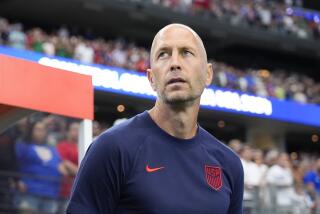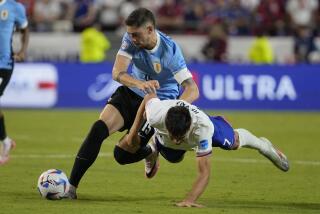Fans Have Been Treated to a Feast
- Share via
The last two months have said a word or two about how the giants of world soccer, Europe and South America, conduct the business of determining their champions.
In Europe, the word this summer has been Opa!
In South America, it’s Copa!
Euro 2004 and Copa America 2004, one opening on the heels of the other, have provided soccer fans with something of a surrogate World Cup in a non-World Cup year. Take the 16 best teams from Europe, then all 10 of South America’s, throw in Mexico and Costa Rica and let them have at it for six weeks, virtually non-stop, with trophy presentations in Lisbon on July 4 and Lima, Peru, on July 25.
They do things differently in their respective corners, as a quick scan of the Euro and Copa championship-game matchups suggest.
At Euro 2004, the final was Greece against Portugal.
At Copa America 2004, the final will be Argentina against Brazil.
Europe, currently glutted with national team coaches obsessed with the stern science of the defensive clampdown, produced the exploding-cigar, snake-in-the-peanuts-can surprise -- Greece, all the way!
South America, where the soccer is often as festive as the non-stop parties in the stands, produced the utterly predictable Argentina and Brazil, stepping over everybody else when they weren’t outright stomping them.
Uruguay gave Brazil a scare in Wednesday’s semifinal, which was tied, 1-1, after regulation, which had taken some amazing creativity on Uruguay’s part.
Uruguay opened the match in a roar and had Brazil on the ropes within the first 13 minutes. Uruguay should have been up two goals and on the way to a Grecian kind of upset, except for two things:
* With the lead for the taking in the second minute, Uruguay’s Dario Silva was denied, point blank, by a sensational sprawling save by Brazil goalkeeper Julio Cesar.
* With the net wide open 11 minutes later and Silva all alone, just mere feet in front of it, Silva somehow, and it was difficult to discern how, popped the ball over the crossbar from an angle that seemed mathematically impossible.
Just like that, Uruguay watched its options shrink from 2-0 to 1-0 to 0-0. The Brazilians were living on borrowed time, for sure, but they hadn’t been buried then and there.
And that, as upset shots at Brazil tend to go, pretty much decided the game, long before Brazil’s 5-3 triumph in penalty kicks.
Uruguay scored the first goal, midfielder Marcelo Sosa heading in a 22nd-minute free kick from Javier Delgado. But even as the Uruguayans celebrated, there was a nagging sense that they hadn’t gotten full return on their efforts -- those nets left empty seemed certain to haunt them, once Brazil rediscovered its legs or had its ears blistered by Coach Carlos Alberto Parreira, whichever came first.
Parreira unloaded during halftime, the teams returned to the field to kick off the second half, and within two minutes, Brazil had equalized, Adriano sneaking behind Uruguay defender Joe Bizera for his sixth goal of the tournament.
After that, Uruguay did well just to last to the shootout. Goalkeeper Sebastian Viera took his team that far with several improbable saves in the second half, but in the shootout, he came up empty. Brazil scored on all five of its attempts, and after Cesar blocked Vicente Sanchez’s try, the final was set -- Brazil versus Argentina, the kind of heavyweight championship match that never materialized at Euro 2004.
Greece was a fun story for casual observers and underdogs everywhere, but serious European fans wondered what had happened to their tournament, supposedly the world’s best and biggest after the World Cup. They aren’t going to want to hear this, either, but earlier this week in Lima, Parreira told reporters he thought the quality of soccer at Copa America was equal or superior to what was on display earlier this summer in Portugal.
“In terms of comfort for the supporters, facilities, stadiums and organization, there’s no comparison,” Parreira said, giving Euro that much. “It’s a reflection of Europe’s far greater economic wealth.
“But in terms of the football which has been played, I don’t think the Copa America is in any way inferior. It’s the same standard -- or, possibly, better.”
It depends on what you’re looking for.
In terms of fielding the best teams, Euro 2004 featured 10 of the top 15 teams in FIFA’s world rankings; the Copa only three -- Brazil (No. 1), “special guest” Mexico (No. 6) and Argentina (No. 11).
And in terms of the best teams bringing their best players, Brazil went to Peru without such star names as Ronaldo, Ronaldinho and Roberto Carlos and Paraguay sent its under-23 Olympic team. That didn’t happen at Euro, although many Dutch fans did accuse Coach Dick Advocaat of not using Holland’s best players.
If you’re looking for goals, Copa has had more of them. Euro 2004 ended with a average of 2.48 goals a game. With two games left, Copa is averaging 2.96.
And if big reputations on final day are what you want, score it for Copa. Greece-Portugal sounded like a first-round game, which, in fact, it was.
Argentina-Brazil?
It doesn’t get much bigger than that.
More to Read
Go beyond the scoreboard
Get the latest on L.A.'s teams in the daily Sports Report newsletter.
You may occasionally receive promotional content from the Los Angeles Times.






